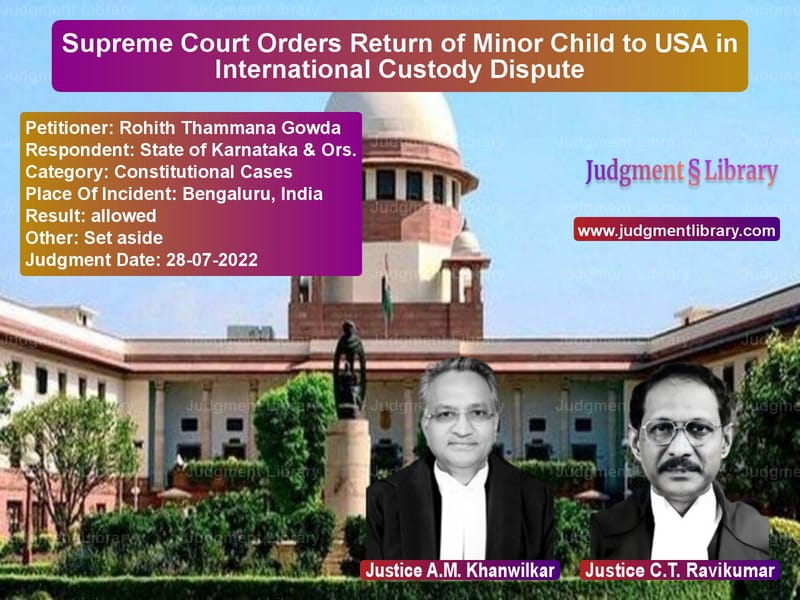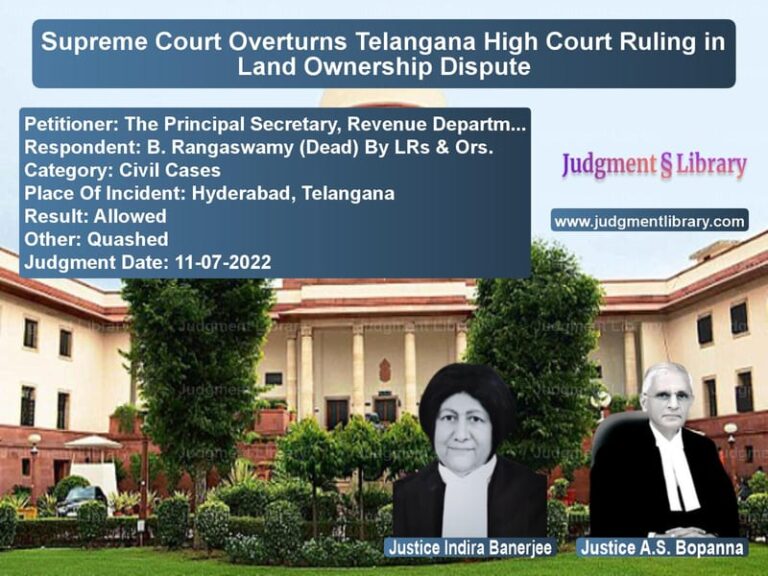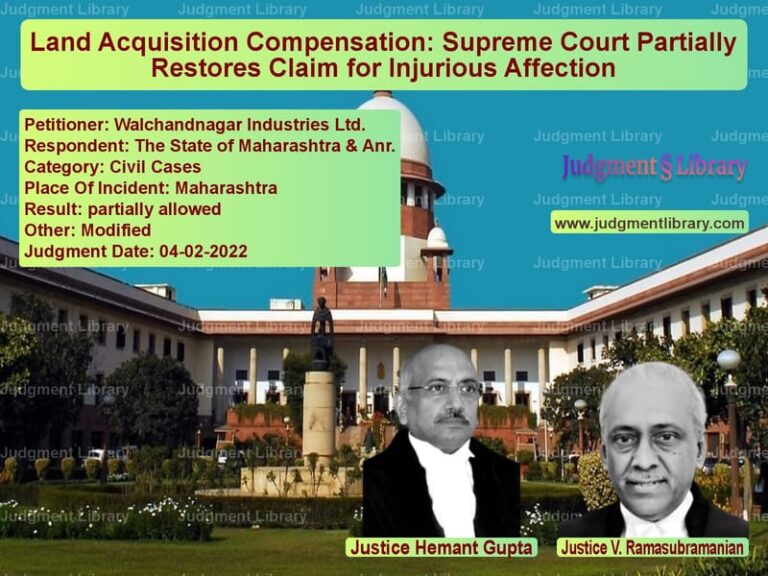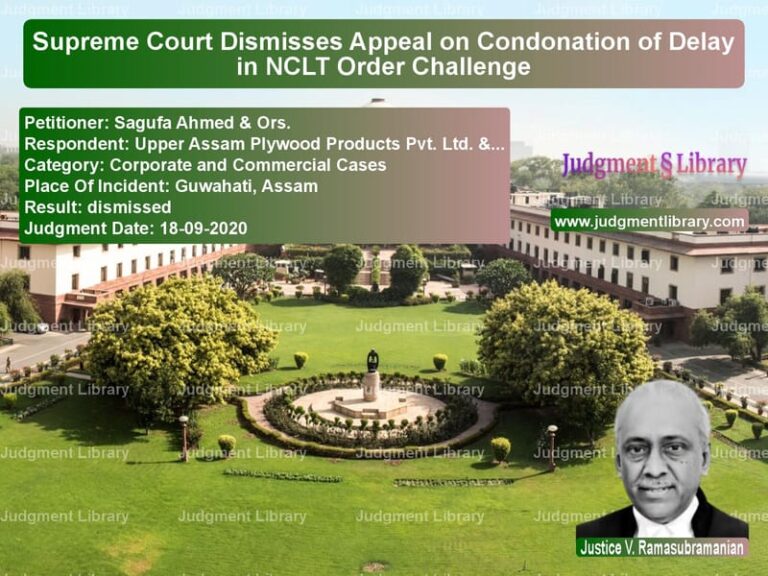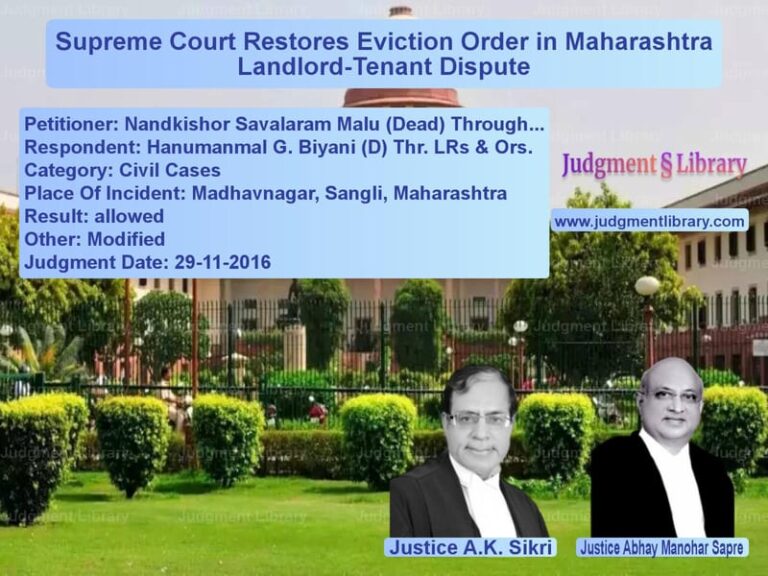Supreme Court Orders Return of Minor Child to USA in International Custody Dispute
The case of Rohith Thammana Gowda vs. State of Karnataka & Ors. revolves around a highly contested child custody battle between an Indian father and his estranged wife. The Supreme Court of India, in its judgment delivered by a bench comprising C.T. Ravikumar and A.M. Khanwilkar, addressed complex issues of international custody, the best interests of the child, and the jurisdiction of foreign courts. In this particular case, the father sought the return of his minor child, Aarya Ranjini Rohith, to the United States, where the child had been living before being brought to India by the mother.
Background of the Case
The petitioner, Rohith Thammana Gowda, had been living in the United States for over two decades. In 2008, he married the respondent (his wife) under Hindu rites, and they moved to the United States where they had a child, Aarya Ranjini Rohith, in 2011. The child was an American citizen, born and raised in the U.S., and was attending school in Washington before the marriage started facing difficulties.
In March 2020, the wife brought the child to India without the father’s consent. The petitioner, upon realizing that his child had been taken from the U.S., filed a complaint in India and also approached U.S. authorities, claiming that the child had been kidnapped. After some time, he found the child in Bengaluru and filed a Habeas Corpus petition in the Karnataka High Court, seeking the child’s return to the United States.
The High Court dismissed the petition, allowing visitation rights but not ordering the return of the child. The petitioner appealed to the Supreme Court, challenging the High Court’s decision.
Legal Issues in the Case
- Was the mother’s removal of the child from the United States without consent an unlawful act?
- Should the orders of foreign courts (U.S. courts) be enforced in Indian courts, especially regarding child custody?
- What is in the best interest of the child, considering the fact that the child is a naturalized American citizen?
- Does the jurisdiction of the U.S. courts supersede that of Indian courts in child custody matters?
Arguments by the Petitioner (Rohith Thammana Gowda)
- The petitioner argued that the U.S. courts had already issued an order for the child’s return to the U.S., and the mother’s actions in taking the child to India without his consent amounted to child abduction.
- The petitioner highlighted that the child had been living in the U.S. for the majority of his life and had significant ties there, including his citizenship, schooling, and family.
- The petitioner further contended that the welfare of the child would best be served by returning the child to the U.S., where the child had a better educational future and prospects.
- The petitioner also argued that the High Court’s decision to dismiss the petition violated the U.S. court’s orders, which had determined that the child should be returned.
Arguments by the Respondent (Wife)
- The respondent argued that the father had willingly allowed the child to stay with her in India and that the child was comfortable in Bengaluru.
- The respondent emphasized that the child had adapted to his new environment and had been attending school in Bengaluru without difficulty.
- The respondent also pointed to the email correspondence between the parties, showing that the father had given implicit consent for the child’s stay in India during certain periods.
- The respondent contended that the U.S. court’s orders did not have jurisdiction over Indian courts, and the child’s best interests were paramount in the decision.
Supreme Court’s Observations
- The Court acknowledged the importance of the child’s welfare as the paramount consideration in child custody disputes.
- It noted that the child was a naturalized U.S. citizen, and the majority of the child’s life and schooling had been in the U.S., making it the child’s primary country of residence.
- The Court also noted that the U.S. court had issued clear orders for the child’s return to the U.S., which should be respected, unless there were compelling reasons to do otherwise.
- The Court held that the parent’s wishes were secondary to the child’s welfare, and it was in the child’s best interest to return to his native country, the U.S., as per the principle of comity of courts.
- The Supreme Court emphasized that while Indian courts are not bound by the Hague Convention on Child Abduction, it is essential to take international court orders into consideration, especially when the child’s habitual residence is in a foreign country.
The Court ruled:
“In light of the circumstances, the child’s return to the United States is ordered, as the child’s best interest lies in returning to the country where he has lived and been educated.”
Final Judgment
The Supreme Court issued the following directives:
- The respondent (wife) is directed to ensure the return of the child to the United States promptly.
- Both the appellant and the respondent are directed to cooperate with U.S. authorities to facilitate the child’s return and relocation to a suitable school in the U.S.
- The Court granted the respondent the liberty to accompany the child to the U.S., subject to the necessary legal formalities and documentation.
- The petitioner (father) is to ensure the necessary arrangements for the respondent’s accommodation in the U.S., if the respondent so desires.
- Any further legal proceedings regarding custody or visitation should be addressed through the appropriate U.S. courts based on the child’s welfare and the existing legal framework.
Implications of the Judgment
- The ruling underscores the importance of international court orders in child custody matters and the need to honor the decisions of foreign courts, particularly in cases where the child’s habitual residence and citizenship are tied to a foreign country.
- It clarifies that parental consent is not sufficient to determine custody if the child’s best interests are not met, especially when there are international precedents in place.
- The decision emphasizes that the welfare of the child must always be the primary consideration, irrespective of parental disagreements and jurisdictional issues.
- The case sets an important precedent for future international custody disputes, reinforcing the notion that children should be returned to their country of habitual residence unless there are compelling reasons to the contrary.
This case highlights the Court’s approach to protecting the rights of children in international disputes, ensuring that the best interests of the child are prioritized in the resolution of custody matters.
Petitioner Name: Rohith Thammana Gowda.Respondent Name: State of Karnataka & Ors..Judgment By: Justice A.M. Khanwilkar, Justice C.T. Ravikumar.Place Of Incident: Bengaluru, India.Judgment Date: 28-07-2022.
Don’t miss out on the full details! Download the complete judgment in PDF format below and gain valuable insights instantly!
Download Judgment: rohith-thammana-gowd-vs-state-of-karnataka-&-supreme-court-of-india-judgment-dated-28-07-2022.pdf
Directly Download Judgment: Directly download this Judgment
See all petitions in Fundamental Rights
See all petitions in Public Interest Litigation
See all petitions in Judgment by A M Khanwilkar
See all petitions in Judgment by C.T. Ravikumar
See all petitions in allowed
See all petitions in Set Aside
See all petitions in supreme court of India judgments July 2022
See all petitions in 2022 judgments
See all posts in Constitutional Cases Category
See all allowed petitions in Constitutional Cases Category
See all Dismissed petitions in Constitutional Cases Category
See all partially allowed petitions in Constitutional Cases Category

